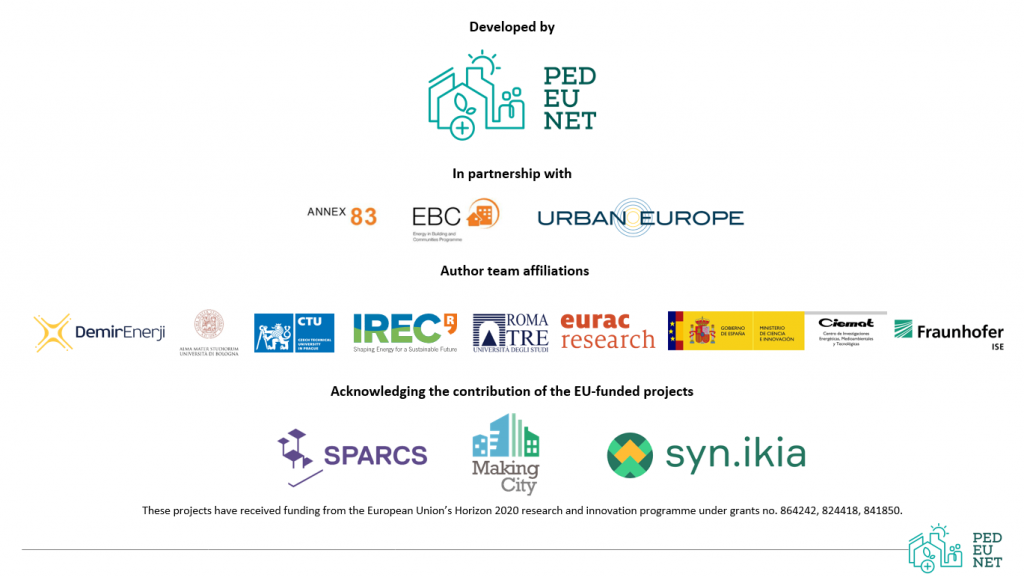| D1P001: Name of the project | |
| D1P001: Name of the project | PED StepWise |
| D1P002: Project assigned code | |
| D1P002: Project assigned code | F-DUT-2022-0419 |
| D1P003: Start date | |
| D1P003: Start date | 11/23 |
| D1P004: End date | |
| D1P004: End date | 10/26 |
| D1P005: Ongoing project | |
| D1P005: Ongoing project | Yes |
| D1P006: Funding programme/financing model | |
| FP7/H2020/HEU/DUT | yes |
| FP7/H2020/HEU | DUT Partnership |
| Interreg | no |
| National funding | no |
| Public-Private Partnership - please specify | no |
| Other | no |
| D1P007: Estimated project costs (Mill. €) | |
| D1P007: Estimated project costs (Mill. €) | 1.42 |
| D1P008: Description of project objectives/concepts | |
| D1P008: Description of project objectives/concepts | The share of new buildings in Europe is estimated to be around 1-2%, so to decarbonise urban areas we need to focus our efforts on existing buildings, but how? The StepWise project will develop a step-by-step, knowledge-based and inclusive process to address technical issues and engage with citizens and other stakeholders. StepWise will facilitate the implementation of innovative strategies for local renewable energy generation, energy flexibility, energy efficiency and sustainable low-carbon mobility that are needed if neighbourhoods are to become carbon-neutral Positive Energy Districts (PEDs). |
| D1P009: Description of project upscaling strategies/potential | |
| D1P009: Description of project upscaling strategies/potential | The upscaling strategies in the PED StepWise project rely on a flexible methodology to replicate and adapt solutions across diverse contexts. A key strength is the heterogeneity of the Living Labs, covering a wide range of use cases that allow for broad application, regardless of geography. The project focuses on integrating the needs and concerns of residents, users, and stakeholders, ensuring that social and economic factors are central to its approach. The step-by-step process, tested in real neighborhoods, ensures scalability while allowing adjustments to local conditions, making the solutions adaptable across different regions. |
| D1P010: Number of PED case studies in the project | |
| D1P010: Number of PED case studies in the project | 3 |
| D1P011: Case Study | |
| D1P011: Case Study | |
| D1P012: Description of project expected impact | |
| D1P012: Description of project expected impact |
|
| D1P013: Standardization efforts | |
| D1P013: Standardization efforts | The standardization efforts in the PED StepWise project focus on developing a standardized process that supports the long-term energy transition strategy. Recognizing that this transition happens over time, the process will be designed to maintain endurance throughout the transition, ensuring consistent progress. This involves defining indicators, targets, and thresholds that guide the step-by-step implementation while ensuring the right communication and activation strategy for stakeholders. Regular revisions of the standards will ensure they remain relevant and effective in guiding the project towards meeting its decarbonization and Positive Energy District (PED) goals. |
| D1P014: Sources | |
| D1P014: Sources | |
| D1P015: Can you specify a suitable contact person regarding the load-management approach within your PED project? | |
| Name | Gerhard Hofer |
| gerhard.hofer@e-sieben.at | |
| D1P016: Would you be willing to share data from your PED project for research purposes? | |
| D1P016: Would you be willing to share data from your PED project for research purposes? | Yes |

Authors (framework concept)
Beril Alpagut (Demir Energy); Giulia Turci (University of Bologna); Michal Kuzmic (Czech Technical University in Prague); Paolo Civiero (Università Roma Tre); Serena Pagliulia (University of Bologna); Oscar Seco (CIEMAT); Silvia Soutullo (CIEMAT); Daniele Vettorato (EURAC Research, IEA Annex 83); Bailador Ferreras M. Almudena (CIEMAT); Vicky Albert-Seifried (FHG ISE)
Contributors (to the content)
Laura Aelenei (LNEG), Nienke Maas (TNO), Savis Gohari (OsloMet), Andras Reith (ABUD), Ghazal Etminan (AIT), Maria-Beatrice Andreucci (Universita Sapienza), Francesco Reda (VTT, IEA Annex 83), Mari Hukkalainen (VTT), Judith-Borsboom (Locality), Gilda Massa (ENEA), Jelena Ziemele (University of Latvia), Nikola Pokorny (CVUT), Sergio Diaz de Garayo Balsategui (CENER, IEA Annex 83), Matthias Haase (ZHAW, IEA Annex 83), Christoph Gollner (FFG, JPI UE), Silvia Bossi (ENEA, JPI UE), Christian Winzer (Zurich University of Applied Science), George Martinopoulos (Centre for Research and Technology Hellas), Maria Nuria Sánchez (CIEMAT), Angelina Tomova (Energy Agency of Plovdiv), Oya Tabanoglu (Demir Enerji), Jelena Brajković (University of Belgrade), Juveria Shah (Dalarna University), Michela Pirro (ENEA), Francesca Sabatini (University of Bologna)
Implemented by
Boutik.pt: Filipe Martins, Jamal Khan
Marek Suchánek (Czech Technical University in Prague)